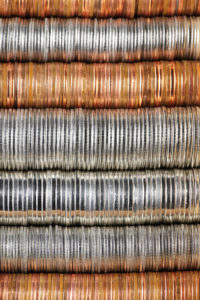
The constant movement of our world doesn’t allow much time to pause when someone we have loved dies. When my mother left this earth, there was a lot to be done and circumstances being what they were, we had to get right to it. My brother and his partner at the time were faced with dismantling the interior of our family home – a structure in itself, a sculpture of sorts. For a period of 42 years it was added to, chiselled at and repeatedly repaired, embellished, rethought and reworked. This natural process began on the day we pulled into the driveway of our new house, the endpoint of that summer’s cross country vacation-moving adventure. It continued as our intersecting lives progressed and changed, my brother and I growing up from teenagehood and my parents growing into their ripe old ages.
We all brought things into this interior structure and we all took things out of it. My parents were avid garage sale attendees and reserved every Saturday morning for them. They were very different people, but neither of them could resist a good bargain. They were both enthusiastic collectors as well, but this was somewhat hidden by my father’s illness. He had Parkinson’s disease and after living well with it for more than 10 years its insidious sapping of life became more obvious as his interest in collecting turned into neurotic hoarding. It was my mother who did her best to keep this in check, so no one paid much attention to things like the multiple sets of everyday dishware stuffed into cupboards or her impressive collection of winter coats.
 As the dismantling began, the history of my parents’ lives and their life together was revealed. It was all there as one would expect. Collectors are collectors because they never want to throw anything away! My mother’s 12 passports, all her evaluations from her career as a young teacher in England, and lists of items to be sold from our house in Montreal before we moved were in this vast archive. So were the letters my father wrote to my grandmother when he was in Africa in the 1950’s, receipts for return travel to Canada and the menu from my parents’ first New Years Eve dinner together. On top of this bedrock much more kept coming into our home than ever left it. Dismantling the interior, to put it mildly, was a mammoth task.
As the dismantling began, the history of my parents’ lives and their life together was revealed. It was all there as one would expect. Collectors are collectors because they never want to throw anything away! My mother’s 12 passports, all her evaluations from her career as a young teacher in England, and lists of items to be sold from our house in Montreal before we moved were in this vast archive. So were the letters my father wrote to my grandmother when he was in Africa in the 1950’s, receipts for return travel to Canada and the menu from my parents’ first New Years Eve dinner together. On top of this bedrock much more kept coming into our home than ever left it. Dismantling the interior, to put it mildly, was a mammoth task.
A major part of this clearing out was, of course, holding a huge garage sale. My contribution to the effort was to go to the bank and get a float, buy some tape, and pick up sandwiches for everyone who came out to help. My friend Jay offered to accompany me on these simple errands and glad for the support, I accepted. Errand #1 at the hardware store was easy. We quickly found and purchased the correct type of tape. Then, to my great surprise, my ‘to do’ list suddenly got very difficult.
Errand #2 was the bank. I told the young woman assisting me that I was there to get a float. I then proceeded to try to break down the number of rolls of coins and the number of bills I needed for each denomination. I couldn’t do it. I got it wrong on the first try. I tried again and got it wrong again. I started to struggle as my anxiety rose. She started to get annoyed. Third try, wrong again. Fourth try, no luck. I felt lost in a vast sea of numbers I could not make sense of and she had clearly lost all patience. “Maybe you should go over there and figure it out,” she said, pointing with her stretched neck toward the other side of the bank. This confirmed and then magnified my ineptitude in computing the float, which I knew should be easy. Under the weight of embarrassment, my mind started to completely shatter.
I became aware of Jay standing beside me with his hands in his pockets, seeming quite relaxed. Like a life boat sailing by just in time, he responded without a moment of hesitation. Calmly, his tone matching his casual demeanour, he said, “No, we’ll stay here and just get this done.” No argument ensued. It was clearly non-negotiable. Having been pulled into the boat, I stopped drowning in my confusion and smoothed out my crumpled dignity enough to keep going. With a little help I muddled through and we left the bank with errand #2 completed. Being faced with a huge array of options at my local Subway sandwich shop on errand #3 was daunting but I did it. Along with the tape and float, I delivered them as requested and on time. Mission accomplished!
This is what the shock of a life-changing loss can do. Grief is far more messy than a set of orderly, linear stages. It’s a roller coaster powered by a collection of difficult, jumbled emotions all clambering for attention at the same time. We have common experiences during the grief journey and one of these is shock. Although it usually occurs at the time of loss, it can be unpredictable and hide from you. It may choose to show up when you least expect it, like it did for me in the bank.
Loss can hit so hard it physically jars you. Your body is the shock absorber for this blow and it can react in many ways. People gasp and scream and yell. They cry and wail. They clutch around their stomachs or they may fall down. Parts of the psyche can freeze too. The mind can go blank or get foggy. Emotions can get frenzied or go flat. This absorbed energy stays in your cells until it finds a way out. I had been able to function well enough to get a lot of rudimentary tasks accomplished because they were concrete and didn’t require much thinking. When I had to use more complex thought processes and do arithmetic, I ran into a pocket of shock that had not yet found an exit.
 The unconscious is highly intelligent and knows what is needed for healing. Perhaps because math has never been a strong point for me, when put under stress that particular area of vulnerability opened up and exposed some of the anxiety bound up in the shock of my mother’s death. That exposure was its way out. As I went through the uncomfortable situation and came out of it successfully that anxiety was free to leave. Healing happens in many moments like these all along the journey. Sometimes leaps happen, especially when a conscious effort is made to grieve and move forward. Mostly though, it’s a slow thaw.
The unconscious is highly intelligent and knows what is needed for healing. Perhaps because math has never been a strong point for me, when put under stress that particular area of vulnerability opened up and exposed some of the anxiety bound up in the shock of my mother’s death. That exposure was its way out. As I went through the uncomfortable situation and came out of it successfully that anxiety was free to leave. Healing happens in many moments like these all along the journey. Sometimes leaps happen, especially when a conscious effort is made to grieve and move forward. Mostly though, it’s a slow thaw.
For me, it wasn’t until the start of the 4th year without my Mum that I could feel myself engaging with the world directly again, instead of a few steps back, behind the screen of grief. For you, it may be different. That doesn’t matter. You have your own unique path. The important thing is to give grief, in all its forms, a safe way out. That is how the screen lifts until one day you notice it’s not there anymore and everything seems a little more vibrant and colourful again.

